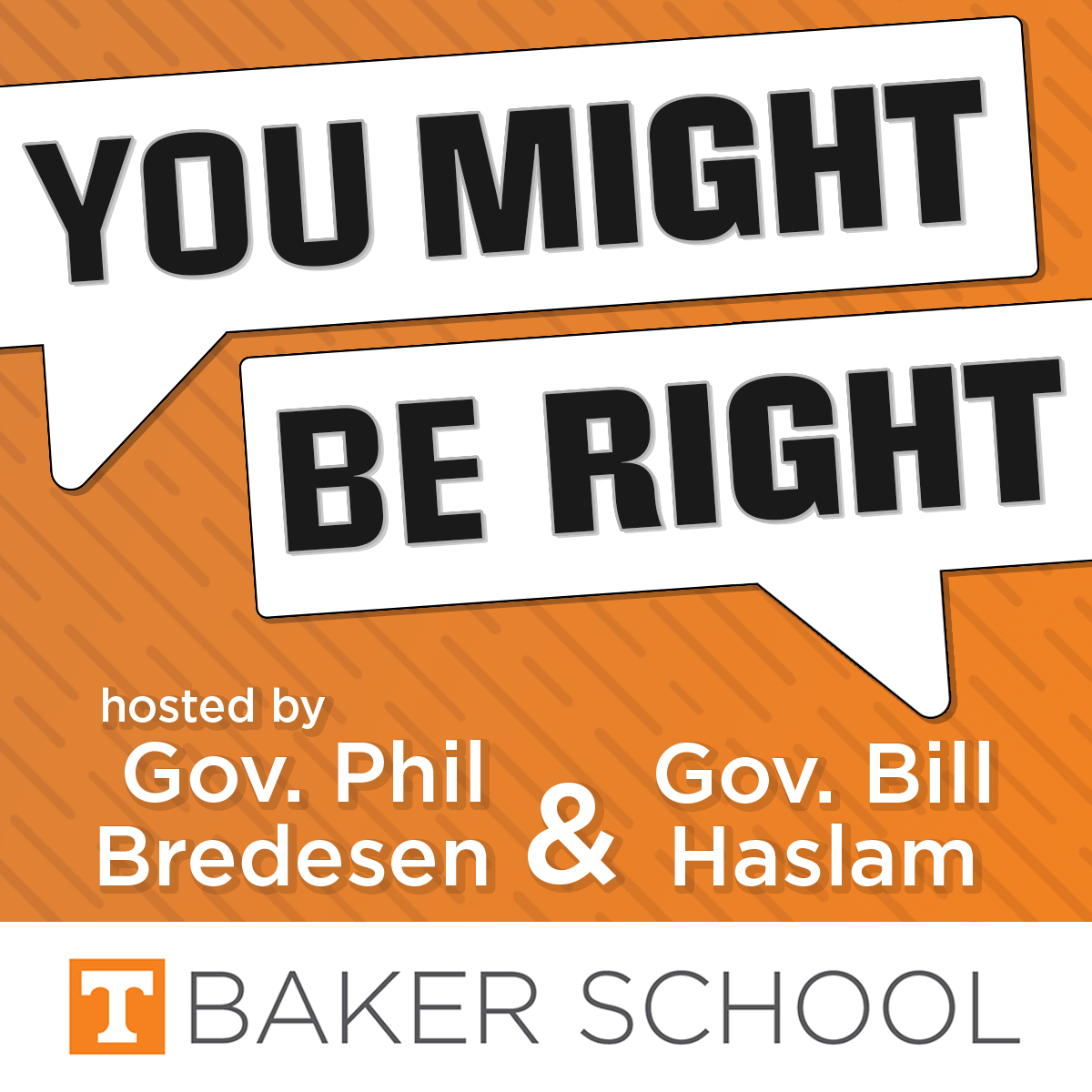2024 Election – What Did We Learn?
An unprecedented presidential campaign ended with the decisive election of Donald Trump. Trump made inroads with nearly every demographic group, riding a wave of global anti-incumbent sentiment and voter dissatisfaction with the economy.
In this episode, our hosts, former Tennessee Governors Phil Bredesen and Bill Haslam are joined by Dr. Andy Busch, Associate Director of the Institute of American Civics at the Baker School, and Dr. Lindsay Chervinsky, a presidential historian and executive director of the George Washington Presidential Library at Mount Vernon, to debrief the election. What have we learned and what can history tell us about what might be next? This episode was recorded on November 14th, 2024, nine days after the presidential election.
Subscribe and follow You Might be Right wherever you get your audio content – including Apple Podcasts and Spotify – to never miss an episode, or sign up for our email list to receive new episodes straight to your inbox each week here.
“Unprecedented, and I use that word carefully”
Chervinsky, You Might Be Right’s first returning guest (hear more from her on our term limits episode) opened the conversation by providing historical context for the election. She noted that that while America has faced moments of intense partisanship in the past, including the 1790s, 1850s, 1890s, and the 1960s, there are some unique elements.
“There are also things about the moment that we are living in that are unprecedented, and I use that word carefully,” she said. “In the previous election, we had never had a major party candidate deny the outcome of the race. Even in the Civil War, the South left because it accepted the result. It didn’t deny the result. And so that is definitely something we’ve never seen before.”
Busch agreed that the election was a mix of both highly unusual and “completely ordinary” elements. “Without knowing anything about the candidates…you had a vice president running when the president had about a 40% approval rating, and two thirds of the people in the country in polls said that they thought that the country was on the wrong track,” he said. “So, in that sense, the outcome at least was completely ordinary…it’s a lot like maybe 1980 or 92 or 2008 when people’s perceptions of the economy were down. They didn’t like the incumbents that much. And you had a major change.”
“Learn your history and know your constitution”
Both Chervinsky and Busch shared advice for those who worry democracy is at risk because of the election.
“If I were to give people advice on either side, one piece of advice would be: learn your history so you understand that this is not a completely unprecedented moment, but also be vigilant,” Busch said. “Know your Constitution, know your rights, know how checks and balances are supposed to work so that if they don’t work, you recognize it. Exercise your right to vote.”
Busch urged both parties to prioritize institutional thinking over short-term gains and highlighted the need to police your own side. Pointing to Howard Baker’s willingness to police his own side during the Watergate crisis, Busch noted, “You just don’t see that as much anymore.”
Chervinsky cautioned against focusing too much on “the rhetoric and the outrage and some of perhaps the more theatrical elements,” of our democratic system.
“Instead, focus on the rule of law. How is the rule of law holding up? How are elections? Are they free and fair and safe?” she said. “Even if we don’t like the outcome, we just had a fantastically free and fair and safe election. Are things like accountability still applicable? Are things like our institutions and representation still applicable? I think if we can focus on the things that actually really genuinely make up what it means to be a republic and try and support those and advocate for those, we’ll be in a much better position.”
“What did we miss?”
In the second part of the episode, Governors Bredesen and Haslam shared their own reflections on the election.
Governor Bredesen noted that his big takeaway was less about strategy and what one side may have done right (or not), and more about the rejection of traditional governance models. “The big thing that seemed to me to happen was this rejection of the style of governing, which this country has had for a very long time in favor of something very, very different,” he said. “What did we miss about what was going on in the country that this whole kind of fundamental approach to government in our country has just been rejected out of hand in this election?”
Governor Haslam theorized that much like Democrats and President Biden saw 2020 as “a time to go big,” Republicans are getting ready to do the exact same thing.
“In this country that’s evenly split, we’re going to go from guardrail to guardrail,” he said. “We veered off hard to the left. President Trump has some pretty decisive activities he’s going to take. He’s going to veer hard to the right…Nobody is going to have this lasting majority until they figure out that living guardrail to guardrail is not a way to have an enduring leadership like the Dems did from FDR all the way up until Eisenhower.”
Subscribe and follow You Might be Right wherever you get your audio content – including Apple Podcasts and Spotify – to never miss an episode, or sign up for our email list to receive new episodes straight to your inbox each week here.

Join the conversation on Twitter by following @UTBakerSchool, @PhilBredesen, and @BillHaslam.


